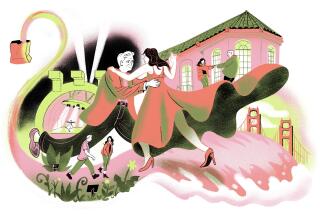Orchestrating a Birthday
At Dennis Hopper’s birthday party Friday night, a woman approached the evening’s star, Esa-Pekka Salonen, who was smoking an after-dinner cigar near the pool. “You’re so young to be in charge of an orchestra,” she told 43-year-old Salonen, music director of the Los Angeles Philharmonic. “Where are you from?” she continued, while her tiny heels sank deeper into the wet grass.
Most of the 150 or so guests at Hopper’s Venice house, however, gave Finnish-born Salonen (who has spent the last decade in L.A.) plenty of reason to feel at home.
Outside the bathroom, two women gave Salonen the right of way. “You’re the guest of honor,” one of them exclaimed. “You should go first.”
Afterward, Salonen grinned as he went off to fetch his wife a glass of water at the bar. “That’s it,” he said of the courtesy. “I’ve arrived.”
The day before at the Dorothy Chandler Pavilion, Salonen had conducted the American premiere of his new orchestral piece, “Foreign Bodies,” to critical acclaim. Hopper’s party was thrown to celebrate the musician’s new work and the actor’s 66th birthday.
Guests came from all parts of the city.
Earlier in the evening, during cocktails, Mike Medavoy, chairman of Phoenix Pictures, talked about the political geography of his turf: Hollywood. He seemed a little glum, saying he wanted to organize a “content versus profit” panel discussion with members of the media and entertainment industry. Arianna Huffington, standing nearby, perked up. She leaned over. “What are you doing?” she inquired, seemingly sensing an opportunity. “A panel discussion?”
At the center of an upstairs room, the host held court, flanked by artists Ed Moses and Robert Graham. Hopper, an avid collector of modern art and an artist in his own right, was getting his share of adulation. He will be honored Wednesday night at the MOCA gala celebrating the opening of the Andy Warhol retrospective.
Finishing their mojitos, guests sauntered downstairs to dine at polka-dotted tables and gaze at Hopper’s collection of contemporary American art: paintings by David Salle, Warhol, Keith Haring.
As he took his seat at one table, Frank Gehry tried to recall what year he built the original half of Hopper’s modern home. (Another building was added later, linked by steel walkways and stairs.)
“I can’t remember, maybe 20 years ago,” he said. “It’s so long ago.” Gehry was abstaining from the Cuban-themed spread, served by waiters in beige cooking jackets. “I can’t eat tonight,” he said, clutching an energy bar and looking a little regretful. At another table, Steve Martin got up for a second helping.
After dinner, guests milled around outside or went exploring the house. Daryl Hannah leaned against a doorjamb, smoking a cigarette. In a corner of the rectangular garden, near the pool, Sean Penn stood under a heat lamp, surrounded by women.
Close to midnight, Caroline Graham who had helped organize the party, sidled up to Hopper’s wife Victoria Hopper (nee Duffy), asking if the Cuban band could pep it up a little. “No,” said the hostess, an apparition in Galliano. “This is not a dance party.”
An Artful Pitch
for a New Theater
On a recent evening in Pacific Palisades, Dustin Hoffman stood in one end of the garden of a private home, looking a little nervous. In a few minutes, he and Amanda Peet were going to perform a one-act play by David Ives for about three dozen people. First, though, Hoffman had to give his pitch. He turned to the assembled guests and cleared his throat.
“It’s not just good for the Westside,” he said of a planned new theater at Santa Monica College, for which he was helping raise funds. “It’s good for the city.”
Then he and Peet gave an even better reason for building theaters: resident actors, eager to take the stage.
After the 15-minute show, opera buff and former Dist. Atty. Gil Garcetti, who had been sitting in front of Tom Hayden, turned and saw the former state senator. “You look great,” Garcetti exclaimed, across the row of chairs. (Both sported out-of-office tans.)
After the short play, guests gathered in small groups on the lawn, launching into their favorite subjects. Hayden talked politics, architect Renzo Zecchetto talked design, and Peet and Hoffman were joined by Ray Liotta for a discussion of theater versus movies. A new theater will have to be accessible and affordable to compete, Hoffman said.
“We have to give the theater a youthful vitality,” he said, recalling a conversation with Arthur Miller when the actor did “Death of a Salesman” in London some years ago. “Miller took me aside and said, ‘When I wrote this play, I didn’t write it for these people. I wrote it for people who couldn’t afford [the theater.]’ I always remembered that,” he said.
He then turned to dedicate his play notes to Peet. “How do you spell colleague,” he asked, joking. Peet blushed and responded, “I’m going to have this framed straightaway.”
City of Angles runs Tuesday through Friday. E-mail angles @latimes.com
More to Read
The biggest entertainment stories
Get our big stories about Hollywood, film, television, music, arts, culture and more right in your inbox as soon as they publish.
You may occasionally receive promotional content from the Los Angeles Times.










